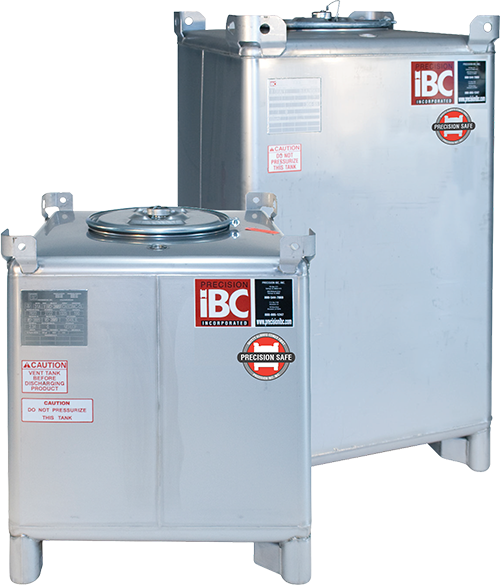The Superiority of SS IBCs Over Carbon Steel IBCs
In the realm of industrial storage solutions, Intermediate Bulk Containers (IBCs) play a crucial role in safely housing and transporting various liquids, chemicals, and materials. Among the array of options available, Stainless Steel IBCs stand out as a superior choice over their Carbon Steel counterparts for several compelling reasons. In this blog post, we’ll delve into the advantages that stainless steel IBCs offer, highlighting their durability, hygiene, and environmental benefits.
Durability and Longevity

One of the most notable advantages of stainless steel IBCs is their exceptional durability and longevity. Stainless steel boasts inherent corrosion resistance, making it highly resilient to rust, corrosion, and chemical damage. This resistance ensures that the container maintains its structural integrity even when exposed to harsh environments or corrosive substances, thus extending its service life significantly.
Unlike carbon steel IBCs, which may require frequent maintenance, coatings, or replacements due to corrosion issues, stainless steel IBCs offer a long-term solution that minimizes downtime and operational costs. Their robust construction withstands the rigors of industrial usage, including transportation, storage, and handling, without compromising performance or safety.
Hygiene and Cleanliness
In industries where sanitation and product purity are paramount, stainless steel IBCs shine. Stainless steel is non-porous and inherently resistant to bacterial growth, making it an ideal choice for storing food-grade ingredients, pharmaceuticals, and other sensitive materials. Unlike carbon steel, which may harbor contaminants or corrode over time, stainless steel maintains a pristine and hygienic environment, safeguarding the integrity and quality of stored products.
Moreover, stainless steel’s smooth surface finish facilitates easy cleaning and sterilization procedures, ensuring compliance with stringent hygiene standards and regulations. This feature is particularly crucial in industries such as food and beverage, pharmaceuticals, and cosmetics, where cleanliness is non-negotiable.
Environmental Sustainability

In today’s environmentally conscious landscape, sustainability is a key consideration for businesses across various industries. Stainless steel IBCs offer environmental advantages over carbon steel alternatives, thanks to their recyclability and longevity. Stainless steel is fully recyclable, with a high scrap value, making it a sustainable choice for companies aiming to minimize their carbon footprint and promote circular economy practices.
Furthermore, the durability and longevity of stainless steel IBCs reduce the need for frequent replacements or disposals, thereby decreasing waste generation and resource consumption over time. By investing in stainless steel IBCs, companies can align with their sustainability goals while enjoying the economic benefits of reduced lifecycle costs and enhanced operational efficiency.
Conclusion
Stainless steel IBCs represent a modern and superior solution for industrial storage needs, offering unmatched durability, hygiene, and environmental sustainability. Their corrosion resistance, cleanliness, and recyclability set them apart from carbon steel IBCs, providing businesses with a reliable and long-term storage solution that prioritizes performance, safety, and sustainability.
Whether used in the food and beverage industry, pharmaceuticals, chemicals, or beyond, stainless steel IBCs deliver the durability and peace of mind that modern businesses demand. By choosing stainless steel, companies can optimize their operations, safeguard product integrity, and contribute to a more sustainable future.